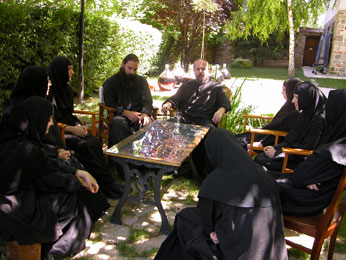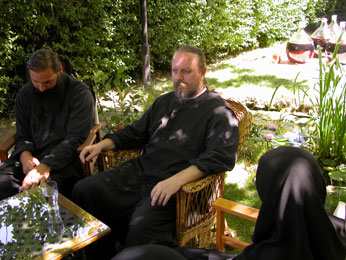Homily on the Gospel about the Demoniacs ( 05.07.2007 )
Interpretation by Metropolitan Nahum of Strumica delivered as a homily at the Holy Liturgy, after the Gospel reading about the demoniacs; including also interpretation of certain other Gospel readings from previous days, at a synaxis (assembly) with the sisters from the monastery of the Most Holy Theotokos Eleusa in Veljusa:


The demoniacs whom Christ had healed pleaded to follow Him, while the local residents lost Him because they had not received Him and had begged Him to leave their district. This Gospel reading shows that demoniacs can be healed easier, since they, being wholly possessed by the demon, have no opportunity to freely decide about their salvation; whereas, they who are conscious and rational are more difficult to heal because, according to free will—which God does not violate—if they remain slaves to passions, they stay unhealed. Free will is like a double-edged sword: we can use it to attain the likeness of God, yet we can also fall away from God. And, God respects our freedom, because if freedom is violated, so is the image after which we were created.
Now then, why do we not receive Christ?—For the sake of satisfaction of our passions, which are more important to us than He is. The example with the Gerasene people shows us that to them the swine were more important—because of the passions of avarice and pleasure-indulgence—than Christ was. It is these passions that the Holy Fathers call rougher, through which the demon assaults at the outset. What, then, to say about the more subtle passion of the mind—pride or high opinion about oneself or vanity—through which the demon assaults at last, which is the last in the row to be cleansed before the transition from one stage of spiritual growth to another? Only due to vainglory and high opinion about oneself, our heart stays shut to the mind-and-heart prayer and the mind remains unillumined.
According to the Holy Fathers’ tradition, the demon occupies the centre of our heart before Baptism. However, when man, at Baptism, receives the grace of God in the centre of his heart, then the demon is cast out of the centre and moves in near the heart. All until the heart is bound by passions and all until it is not sufficiently purified, that is to say, all until man has not reached the second stage of spiritual growth (illumination), the demon resides near our heart. Hence, until man is at the first stage and until his heart is bound by the passions, while his mind does not know the place of the heart and has no mind-and-heart prayer, there is no need for the demon to assault him from outside. It is completely sufficient for the demon to assault him from inside, through thoughts. If the man accepts them, they are sufficient for a fall and defilement of the heart. For instance, someone may bother us with his very appearance, by the way he walks, eats, talks…, not having done to us anything at all really. Apparently, we are the ones who have a problem and this problem is inside us. We see the world around us through our passions, and the demon is the one who tries to blow up and interpret the events. Even if someone does something that we consider threatening or insulting to us, it is for our own good, because it makes us aware that we have no love and humility to cover this. For, Christ is our criterion, not some human justice. What does it mean, Christ to be our criterion? It is so always when at any temptation we do not examine why, how much and who wronged us, but rather whether or not our thoughts, feelings and prayer at that particular moment are similar to Christ’s while He was on the Cross. It is our task at every such temptation to look for the problem inside us—that is, to see how much vanity, hatred, rage, intolerance and alike there is within us. In fact, it is exactly why the Lord allows we to be tempted, so that we see what we have inside our heart and from what we should free ourselves. At this, we should always know that the Lord will never allow we to be tempted beyond our strength. Whenever we try to locate and look for the problem outside us, we should know we have strayed from the straight and narrow.
While we are at the first stage of spiritual growth, we must not even think that the problem might be outside us. At the second stage it may theoretically be said that the problem is from the outside, because the demon assaults us from outside, through people; yet, since his aim is by a powerful and concrete attack to awaken the part of the passions that has not been completely transformed, then as well we should be aware that the problem is anyhow inside us. In fact, not a single position (not even the third stage) gives us the safety and right to think the problem is outside us. Except, of course, if someone thinks he has attained Christ’s perfection. Thus also at the second stage of spiritual growth (illumination), when it comes to happen even some people to whom we have not done any evil and who have not even met or seen us ever in their life to manifest great enmity towards us, then also we should look for the problem inside us. In that case, too, we should not seek human justice but rather love these people, having Christ as the sole criterion of our conduct, if we want to purify our heart. We ought to know that everything happens according to the rules of spiritual law. At first, the demon assaults us through the more rough passions (pleasure-indulgence and avarice), and in the end through the most subtle one—vainglory. The demon always struggles to regain the lost positions, even to go back into the centre of our heart.
Each stage of spiritual growth has a corresponding rank of priesthood. If someone has a priestly rank that does not suit the stage of his spiritual growth and if along with this he does not live in ascesis and obedience at all, he loses even the prayer he has. If he does not stand up with his mind before God’s throne in his heart, what use then if he stands with his body before God’s throne in church? Even he who has the episcopal rank should live in the struggle of inner obedience, that is, he should subject his mind to another mind, to his elder’s mind, if for his outward rank he has no inner coverage, i.e. at least illumination of the mind and mind-and-heart prayer. Otherwise, he will suffer much until he has learnt the lesson. The purification from the main passion of pride is based on obedience. Otherwise, it happens a man to make progress in terms of ranks and to regress in spiritual life. As a consequence to this, various divisions and splits take place in the Church.
Christ says, “I have not come to call the righteous, but sinners to repentance”; also, “It is not the healthy who need a doctor, but the sick”. He who does not consider himself sick and sinful, has no share with Christ. Yet, since Christ loves us, He allows we to fall into sin even in reality, even to become ill physically, so that we realise we are sinful and sick and as such seek Him.
In terms of our struggle against the demon, we should know that the demon attacks us with his mind. It is his mind against ours. If in our mind we consent to what he suggests, i.e. if we agree with his thought, we lose grace and become darkened. Thus, we lose grace not when the demon assaults us with some energy of his, but when we have accepted with our free will what he had suggested to us. We should also know that the demon does not know what we think further on and what is happening inside us. Yet, being an old fighter, he knows from experience and makes conclusions by our outward behaviour. Hence, we must not show outwardly by anything what is happening inside us during a temptation. We should humble ourselves and say, “Thank You, Lord, for everything, I am suffering because of my sins and my impurity—blessed be the Name of the Lord”, and then say the Jesus prayer. If we say it with concentration, in a short while we become as if fire. Just like an electric ring, which when we turn it on, no one can touch without burning himself. Then even if he tries to approach us, the demon will quickly retreat since prayer burns him. Nonetheless, we should also have the right attitude in prayer. It is so when we experience prayer as our giving and say it out of love towards God and our desire to be with Him. Then such prayer is more constant and the demon can hardly approach us. If, on the contrary, we say the prayer with the attitude of a demand, that is, only as a struggle against the demon, then it may quickly be interrupted.
Our inner strives we should not reveal to anyone else but the one in charge of this (our spiritual father), or else the demon will come to necessary information. In this way we exclude building of parallel relations (the beginning of every evil); spreading fear of the demon, his influence and many other things connected to this are prevented. Yet we should also not fear the demon. He, according to the Holy Fathers, after Christ’s Resurrection is dangerous to us merely as a toy in a little child’s hands. We should fear wrong waging of the war. This is the reason for our lost battles…
All that bothers us from outside, we should embrace in our prayer and then we will feel it as a part of us and it will stop bothering us.
When we know that we are impassioned, darkened and under great inner influence of the demon, why do we look for the problem outside us? Why do we always self-justify ourselves, and put the blame for all on others? When we locate the problem outside us, we are out of the Road, out of Christ, out of the Gospel of Christ, out of the Spirit of Christ, out of our own heart… We leave the narrow road and run along the broad one. Self-justification and condemnation of the other one are certain signs that underneath our feet is the broad way.
(as recorded by the monastery Sisters)